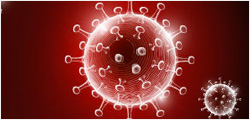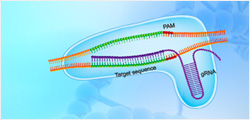The relative roles of SULF1 and SULF2 enzymes in tumour growth are controversial, but short SULF1/SULF2 splice variants predominate in human mammary tumours despite their non-detectable levels in normal mammary tissue. Compared with the normal, the level of receptor tyrosine kinase (RTK) activity was markedly increased in triple-positive mammary tumours during later stages of tumour progression showing increased p-EGFR, p-FGFR1 and p-cMet activity in triple-positive but not in triple-negative tumours. The abundance of catalytically inactive short SULF1/SULF2 variants permits high levels of HS sulphation and thus growth driving RTK cell signalling in primary mammary tumours. Also observed in this study, however,... More
The relative roles of SULF1 and SULF2 enzymes in tumour growth are controversial, but short SULF1/SULF2 splice variants predominate in human mammary tumours despite their non-detectable levels in normal mammary tissue. Compared with the normal, the level of receptor tyrosine kinase (RTK) activity was markedly increased in triple-positive mammary tumours during later stages of tumour progression showing increased p-EGFR, p-FGFR1 and p-cMet activity in triple-positive but not in triple-negative tumours. The abundance of catalytically inactive short SULF1/SULF2 variants permits high levels of HS sulphation and thus growth driving RTK cell signalling in primary mammary tumours. Also observed in this study, however, was increased N-sulphation detected by antibody 10E4 indicating that not only 6-O sulphation but also N-sulphation may contribute to increased RTK cell signalling in mammary tumours. The levels of such increases in not only SULF1/SULF2 but also in pEGFR, pFGFR, p-cMet and Smad1/5/8 signalling were further enhanced following lymph node metastasis. The over-expression of Sulf1 and Sulf2 variants in mammary tumour-derived MDA-MB231 and MCF7 cell lines by transfection further confirms Sulf1-/Sulf2-mediated differential modulation of growth. The short variants of both Sulf1 and Sulf2 promoted FGF2-induced MDA-MB231 and MCF7 in vitro growth while full-length Sulf1 inhibited growth supporting in vivo mammary tumour cell signalling patterns of growth. Since a number of mammary tumours become drug resistant to hormonal therapy, Sulf1/Sulf2 inhibition could be an alternative therapeutic approach to target such tumours by down-regulating RTK-mediated cell signalling.



































